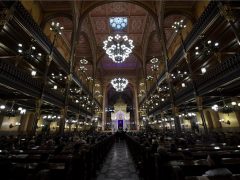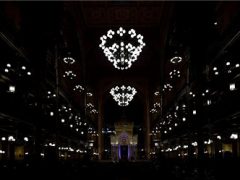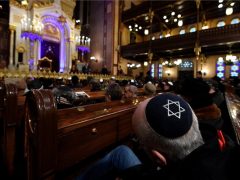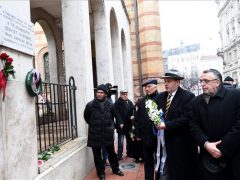A commemoration was held in Budapest’s Dohány Street Synagogue on Sunday to mark the 75th anniversary of the liberation of city’s ghetto. Róbert Frölich, the synagogue’s chief rabbi, said the tragedy of the Hungarian Jews did not begin when the first trains departed for Auschwitz. The persecution of Jews started with words, ideologies, writings, with changes in the public discourse, with thoughts and emotions that marked the path towards the setting up of the ghetto. It is a mistake to believe, he added, that “those in the highest places did not know about the establishment of the ghetto, that they did not take a decision and did not agree. Those in Buda Castle were aware and approved of it and allowed it to happen. This historic responsibility cannot be washed off the one-time resident of Buda Castle,” the chief rabbi said.
Many people ask the question, Frölich noted, “don’t you Jews exaggerate this remembering the Holocaust?” “But is it possible to exaggerate remembering the fact that they tried to exterminate our fathers and grandfathers, that they wanted to take away our right to be born … that they erased 600,000 Jews just like that from the society of this country?” “We can’t not remember because we would then be condemned to forget, and there would be nothing to stop the past from happening again,” he said.
Vince Szalay-Bobrovniczky, state secretary of the Prime Minister’s Office, said that each generation must think about the crimes of the past so that “we can understand and pass on the painful sacrifice of our ancestors”. He said Hungary’s constitution today guarantees human dignity and human rights equally for everyone.
Yakov Hadas-Handelsman, Israel’s ambassador to Hungary, said that 75 years ago there were 70,000 persecuted Jews living among the walls of the ghetto and more than 20,000 Jews were hiding in terror across the city. For most of these people, the arrival of the Red Army and the liberation of the ghetto meant escaping death, he said.
MTI
Photos: Tibor Illyés/MTI






















